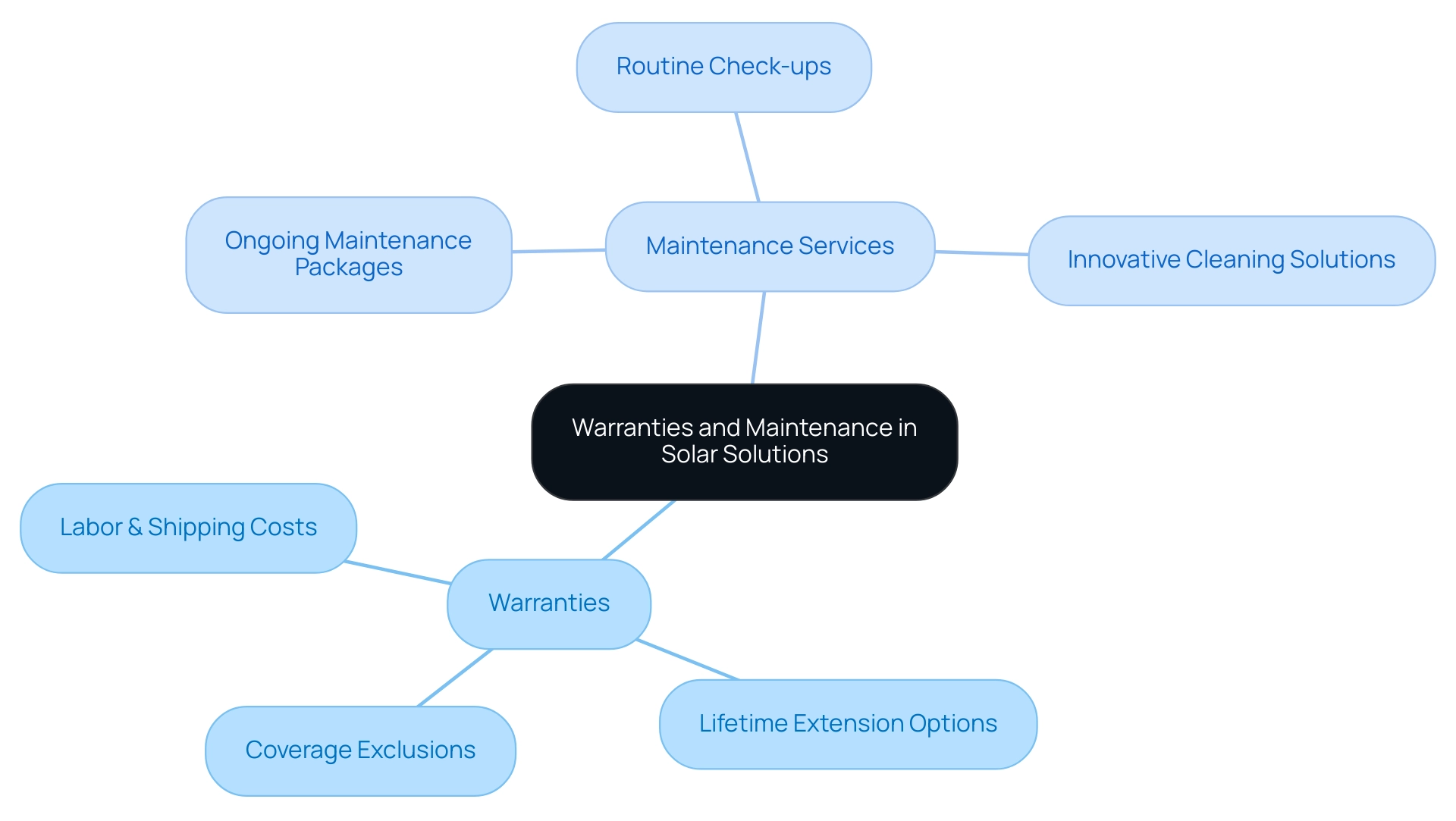Introduction
Choosing the right solar service provider can feel overwhelming, especially with so many options available today. Homeowners are not just looking for a company to install solar panels; they want a partner who understands their unique energy needs and can guide them through the process.
From evaluating a provider’s experience and local expertise to understanding the nuances of warranties and maintenance, there are several critical factors to consider. As the solar industry evolves, new technologies and financing options emerge, making it essential for homeowners to stay informed.
This article delves into the key elements that can help homeowners make an informed decision, ensuring they not only invest wisely but also enjoy the long-term benefits of solar energy.
Key Factors to Consider When Choosing a Solar Service Provider
Choosing the appropriate solar service providers for your home’s power requirements is similar to discovering the ideal partner—there are several important factors to take into account. Begin by examining the company’s experience and certifications. A solar service provider with a strong track record in residential installations, particularly within your community, can make a significant difference.
Local expertise often means they understand the specific conditions of Long Beach, which can greatly enhance the performance of your energy system. Additionally, consider whether the solar service providers offer customized solutions to meet your individual energy requirements. Remember, a one-size-fits-all approach rarely delivers the best results!
It’s also wise to evaluate their financing options. Look for solar service providers who are transparent about costs and potential savings, as this transparency is crucial for making informed decisions. For example, Powercore Electric provides flexible financing alternatives that can suit different budgets, making renewable energy more attainable for renters.
As Ben Zientara, an experienced energy policy analyst, highlights, access to backup power is becoming increasingly essential for homeowners—particularly with the growing interest in energy systems combined with battery storage. In fact, access to backup power was the primary reason homeowners installed batteries in 2023. By 2028, it’s anticipated that 28% of new installations will include storage solutions, driven by changing policies and incentives.
This trend highlights the importance of selecting solar service providers who not only offer strong energy solutions but also understand these advancements in the industry, ensuring you receive the finest assistance possible.
Customer testimonials reflect the quality of service provided by Powercore Electric, with one satisfied client stating, ‘Ryan and his team were great. They were quick, effective, and remained on schedule for our energy installation.’ Such feedback illustrates how they meet the needs of California homeowners.
Dive into the trends shaping renewable energy, including government programs and Tesla home chargers, and consider how a knowledgeable, community-focused provider can enhance your experience.
Understanding Pricing and Profitability in Solar Services
When it comes to pricing for renewable energy, eco-conscious homeowners will find a landscape filled with variability influenced by size, technology, and the complexity of the installation. While some companies may lure you in with aggressive pricing, it’s crucial to look beyond the initial costs and consider the long-term profitability of your investment. For instance, a provider offering slightly higher upfront costs might equip you with superior panels and warranties, leading to significant savings down the road.
Additionally, exploring various incentives, rebates, and financing options can substantially shape the overall cost of your energy system. Recent trends indicate that the average residential photovoltaic installation cost has dropped from approximately $40,000 in 2010 to about $25,000 today, making renewable energy a competitive option for homeowners. In states like Wyoming, homeowners can experience significant savings—over $12,000 after tax credits—when they choose renewable energy, with installation costs averaging $3.56 per watt.
Meanwhile, in Washington, the average 25-year savings from photovoltaic systems is approximately $21,475, further highlighting the long-term benefits. Moreover, EnergySage reports that their prices are over 25% lower than the national median price for photovoltaic systems, which was $4.20/W in 2023, providing a competitive edge in the market. Additionally, Tesla home chargers provide a seamless integration with renewable energy systems, allowing homeowners to charge their electric vehicles sustainably.
Government programs can further enhance affordability through rebates and incentives, while regular panel cleaning services ensure optimal efficiency. As Samantha Hawrylack aptly puts it, “You may be wondering what the difference is between panels on the ground versus on the roof. Learn which one is best suited for your needs.” Making an informed decision now can pave the way for a brighter, more sustainable future.
The Role of Customer Feedback in Evaluating Solar Companies
When it comes to selecting the right energy company, customer reviews can serve as a treasure trove of insights for those considering solar service providers. Powercore Electric stands out, with testimonials highlighting their fast, efficient service and commitment to staying on schedule during installations. One satisfied customer noted, “Ryan and his team were great.
They were quick, effective, and remained on schedule for our energy installation.” Such feedback emphasizes the importance of installation quality, responsiveness, and ongoing support, particularly in California communities. With a combined contracted pipeline of over 25 GW from major players like Amazon, Google, and Meta, the renewable energy sector is witnessing significant growth, making customer experiences more critical than ever. Homeowners have shared their satisfaction with Powercore Electric, often recommending them to friends, which underscores the company’s local expertise and customer-first approach.
While platforms like Yelp and Google Reviews offer a wide range of opinions, don’t overlook specialized forums or local community groups where homeowners share their experiences in more detail. Insights from the fourth semi-annual Marketplace Intel Report reveal trends in renewable energy economics and customer preferences, emphasizing the importance of these reviews. A company’s response to negative feedback can disclose much about their commitment to customer satisfaction and recovery.
As Shawn O’Brien, President & CEO of NABCEP, aptly states, “We expect that the data from this year’s SolarReviews annual Solar Industry Survey will closely match what we hear from PV industry professionals all around the globe.” This emphasizes how essential it is to take customer input into account as a reflection of not just quality but also as a guide for possible challenges and achievements in your energy journey with solar service providers. Furthermore, the recent EnergySage report offers current information on customer experiences, ensuring that your decision-making process is guided by the latest insights on renewable solutions.
Homeowners can gain from various alternatives, including:
- Tesla home chargers for convenient electric vehicle charging
- Expert panel cleaning options to maintain efficiency
- Battery storage solutions that enhance energy independence
Warranties and Maintenance: Ensuring Long-Term Value in Solar Solutions
When examining solar service providers, it’s essential to pay close attention to the warranties they offer for both equipment and installation. A strong warranty not only offers peace of mind but also protects against possible problems that may occur during the lifespan of your energy setup. Recent news indicates that new homeowners with SunPower energy systems may need to file warranty claims with specific component manufacturers or homebuilders, highlighting the importance of understanding warranty coverage from the outset.
Leonardo David, an experienced energy consultant, emphasizes that these warranties can significantly influence your investment in renewable energy. To truly gauge the reliability of a warranty, consider asking critical questions about:
- Coverage exclusions
- Lifetime extension options
- Whether labor and shipping costs are included
This scrutiny is echoed in the case study titled ‘Key Questions to Ask,’ which underscores the necessity of addressing these questions to understand the true value of the warranty and whether it will hold up when needed most.
In addition to warranties, don’t overlook the value of maintenance services.
Routine check-ups can significantly improve your energy network’s performance and lifespan. Many solar service providers now offer ongoing maintenance packages, making it a wise investment for keeping your system running at peak efficiency. Proactive maintenance not only aids in avoiding expensive repairs later on but also guarantees that your renewable solution remains a dependable source of power for years ahead.
Furthermore, utilizing innovative cleaning solutions can help maintain optimal efficiency by removing dirt and debris that may accumulate on the panels. By prioritizing both warranties and maintenance, eco-aware homeowners can prepare their residences for long-term success in utilizing renewable power effectively. This is particularly important for tenants in Long Beach, who can investigate particular options such as community power initiatives or local incentives aimed at making eco-friendly solutions more accessible.

The Influence of Technology on Solar Service Value
Technology is at the heart of the value provided by solar service providers, making it essential for homeowners to understand its benefits. Recent innovations like high-efficiency photovoltaic panels and smart inverters can significantly boost energy production and enhance overall system performance. As we look ahead to 2024, experts from BNEF predict that photovoltaic additions will surge to 574 GW—29% higher than the previous estimates for 2023—indicating a robust market for advanced technology.
However, the renewable energy sector faces challenges such as:
- Interconnection
- High voltage power equipment procurement
- Labor availability
These challenges could impact the pace of growth. Moreover, progress in storage solutions, particularly with the top battery choices such as:
- Lithium-Ion
- Flow technologies
- Lead-Acid batteries
are changing how homeowners make use of their investments in photovoltaic power. For instance, Lithium-Ion batteries are known for their high efficiency and longer lifespan, while Flow batteries offer scalability and eco-friendliness.
Important factors for choosing a battery for renewable power include:
- Capacity: Determines how much power can be stored
- Efficiency: Affects how much of the stored power is usable
- Lifespan: Impacts long-term expenses
- Price: Varies among different battery types
- Ecological advantages: Such as recyclability
With California’s net metering policy fueling demand for photovoltaic installations combined with battery storage, it’s anticipated that by 2028, 28% of all new distributed renewable capacity will include storage, compared to just under 12% in 2023. This trend illustrates an increasing awareness of the significance of storing surplus power for future utilization, enhancing the overall worth of photovoltaic systems.
Additionally, the renewable energy sector has been identified as an industry of opportunity for veterans, with 8% of employees in this field being veterans, compared to 5% in the overall U.S. workforce, highlighting the potential for job creation in this growing sector. When exploring different solar service providers, ensure to inquire about the technologies they employ and how these innovations can cater to your specific energy needs. Staying updated on the latest trends not only empowers you but also helps you select solar service providers that offer the best long-term value for your solar journey, particularly in terms of eco-friendly cleaning options for maintaining your solar panels.
Conclusion
Choosing the right solar service provider is a significant step towards enjoying the long-term benefits of solar energy. Throughout this article, key factors such as:
- Experience
- Local expertise
- Customer feedback
- The importance of warranties and maintenance
have been highlighted as essential components of an informed decision-making process. Homeowners should prioritize providers who not only understand their unique energy needs but also offer tailored solutions and transparent pricing.
As the solar industry continues to evolve with new technologies and financing options, staying informed is crucial. Innovations like energy storage solutions and high-efficiency panels can enhance the value of solar systems, making it more important than ever to select a provider that embraces these advancements. Additionally, customer testimonials serve as a valuable resource, offering insights into a company’s reliability and quality of service.
Ultimately, investing in solar energy is not just about reducing utility bills; it’s about making a sustainable choice that benefits both the environment and the homeowner’s future. By carefully evaluating potential providers and considering all aspects of their offerings, homeowners can ensure they are making a wise investment that aligns with their values and energy goals. As the demand for solar energy grows, making a well-informed choice today can pave the way for a brighter, more sustainable tomorrow.


